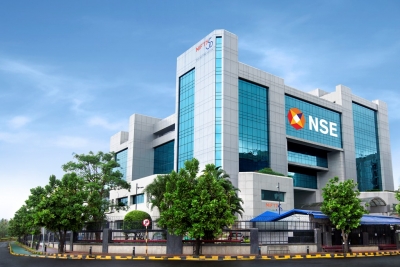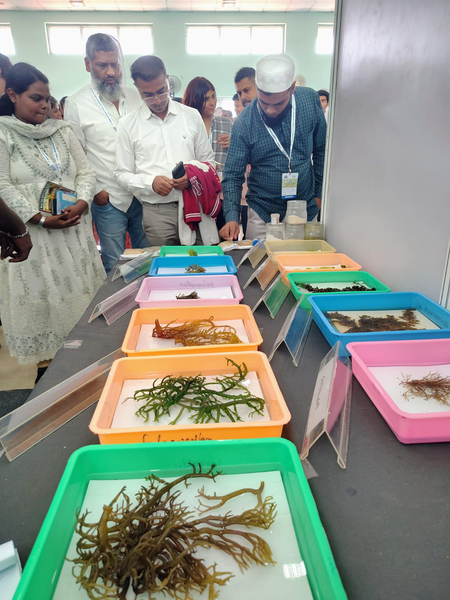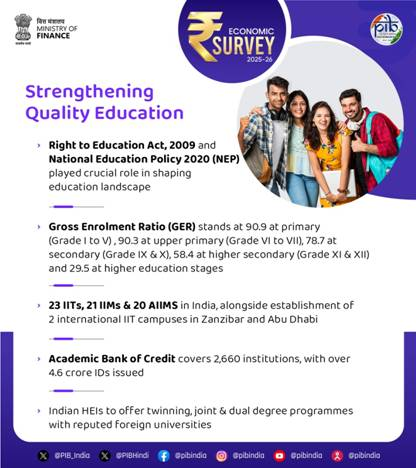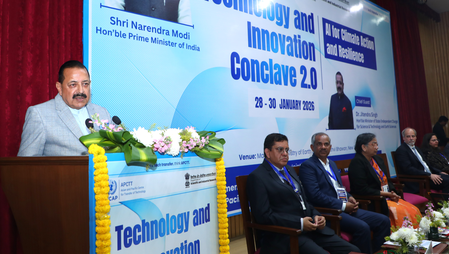Technology
Indian scientists develop single-unit device to capture, save solar energy

New Delhi, Feb 2 (IANS) Indian scientists at the Department of Science and Technology (DST) have developed a solar-powered energy storage device that can both capture and store energy in a single unit, marking a major step towards clean, self‑sustaining storage systems, an official statement said.
Unlike conventional solar systems that require separate units for energy harvesting and storage, the new technology can do both functions, reducing cost and energy losses during conversion, it said.
The statement from the Ministry of Science and Technology said the device known as photo-rechargeable supercapacitor was developed by researchers at the Centre for Nano and Soft Matter Sciences, Bengaluru under DST.
The new technology paves way for efficient, low cost, and eco-friendly power solutions for portable, wearable, and off grid technologies, it said.
Conventional hybrid systems relied on additional power management electronics to regulate voltage and current mismatches between the energy harvester and the storage unit.
The resultant system complexity and device footprint was detrimental for miniaturised and autonomous devices, the statement said.
The innovation used the help of binder-free use of nickel-cobalt oxide (NiCo2O4) nanowires, which have been uniformly grown on nickel foam using a simple in situ hydrothermal process.
“These nanowires, only a few nanometres in diameter and several micrometres long, form a highly porous and conductive 3D network that efficiently absorbs sunlight and stores electrical charge. This unique architecture allowed the material to act simultaneously as a solar energy harvester and a supercapacitor electrode,” the statement detailed.
When tested for real-world applications, the device delivered a stable output voltage of 1.2 volts, maintained 88 per cent of its capacitance retention even after 1,000 photo-charging cycles.
Further, it operated efficiently under varying sunlight conditions-from low indoor illumination to intense sunlight. This stability indicates that the nanowire structure can endure both mechanical and electrochemical stress over extended periods of use, the statement noted.
The self-charging power system can function anywhere even in remote regions without access to an electrical grid and can substantially reduce dependence on fossil fuels and conventional batteries.
—IANS
aar/pk
NSE finally gets SEBI nod for IPO, all eyes on DRHP now

Mumbai, Jan 30 (IANS) The National Stock Exchange (NSE) on Friday announced it has received the SEBI approval for its long-awaited initial public offering (IPO).
NSE's IPO plans had been stalled for more than a decade as the markets regulator did not grant approval due to regulatory concerns related to governance lapses and the co-location case.
With SEBI’s nod in place, NSE will now finalise the structure and timing of its IPO. NSE is reportedly said to be planning to file its draft listing papers by the March end, and is in discussions with investment bankers and law firms to finalise the IPO papers.
However, the NSE IPO depends on the clearing of the draft red herring prospectus (DRHP).
“We are delighted to receive SEBI approval for our IPO — a significant milestone in our growth journey. With SEBI’s approval, we embark on a new chapter of value creation for all our stakeholders,” said Srinivas Injeti, Chairperson, NSE.
“This approval also reinforces confidence in NSE being an integral part of the Indian economy and a beacon of Indian capital markets,” he said in a statement.
NSE has been trying to list its shares since 2016. However, the plan was held up due to regulatory probes linked to its co-location facility and broader governance issues.
Ashishkumar Chauhan, Managing Director and Chief Executive Officer of the NSE, this month visited Tirupati with his family and offered prayers at the temple of Lord Venkateshwara, seeking blessings for the exchange, its members, shareholders and the country. He said that prayers were offered for the well-being of NSE and for the broader growth of the nation.
Earlier, SEBI Chairman Tuhin Kanta Pandey stated that NSE was expected to receive approval for its much-awaited IPO within this month.
Market participants were closely watching regulatory developments around NSE’s proposed IPO, which is expected to be one of the most significant listings in India’s capital markets. NSE is the most widely held unlisted firm in India.
--IANS
na/
Seaweed output triples in a decade as India targets scale-up in cultivation and processing

Kochi Jan 29 (IANS) India’s seaweed production has nearly tripled over the last decade, rising from 18,890 tonnes in 2015 to 74,083 tonnes in 2024, as the Centre positions the sector as a new pillar for coastal livelihoods and bio-based industries, Union Minister of State for Fisheries George Kurian said on Thursday.
Addressing the 7th India International Seaweed Expo and Summit at the ICAR–Central Marine Fisheries Research Institute (CMFRI) via video-conferencing, Kurian said India was poised for a major expansion in seaweed cultivation and downstream industries, backed by policy support aimed at scaling up production, processing and value addition.
Seaweed had been included as an output component under the PM Dhan-Dhaanya Krishi Yojana, which covers 100 aspirational districts nationwide, he added.
In Kerala, Kozhikode, Kannur, and Kasaragod have been identified under the programme, signalling a push to integrate seaweed farming into broader rural and coastal development initiatives.
According to the Minister, the focus would be on improving farmer participation, strengthening supply chains and creating employment opportunities, particularly for fishers and women in coastal regions.
The two-day event is jointly organised by the Indian Chamber of Commerce, the CMFRI and the Central Salt & Marine Chemicals Research Institute (CSMCRI), and brings together policymakers, scientists and industry stakeholders.
Emphasising the need to move beyond pilot-scale operations, National Fisheries Development Board (NFDB) Chief Executive B.K. Behera called for the establishment of large-scale processing plants to support commercial production.
He said stronger coordination among ministries and implementing agencies was critical to accelerate sectoral growth and attract private investment.
The expo showcased the expanding industrial applications of seaweeds, ranging from food and nutraceutical products such as nutritional powders, thickeners and gelling agents to non-food applications including bio-fertilisers, animal feed, bioplastics, soaps, and aqua gels.
Several exhibitors also highlighted innovations in sustainable packaging and marine-based inputs.
With participation from delegates across more than 10 countries, including the US, Australia, France and Indonesia, the summit is positioned as a B2B platform to facilitate partnerships across the seaweed value chain, from cultivation and processing to exports.
--IANS
sg/vd
India made notable gains in school enrolment, higher education institutions, says govt

New Delhi, Jan 29 (IANS) India has made notable gains in school enrolment and higher education institutions, the government stated in the Economic Survey 2025-26 on Thursday.
The Survey tabled in the Parliament by the Union Minister for Finance and Corporate Affairs, Nirmala Sitharaman, credited the achievement to strengthened infrastructure and teacher capacity, due to policies such as the Right to Education Act 2009, and the National Education Policy 2020 (NEP).
Other measures include updated UGC guidelines, regulations for academic collaboration and mutual recognition of qualifications, and permissions for foreign branch campuses, including those in GIFT City.
“Achievements in the education space have been marked by enhanced literacy rates, increasing enrolment in schools and higher education institutions, provision of vocational education avenues, etc. The Right to Education Act 2009 and the National Education Policy 2020 (NEP) have played a crucial role in shaping the education landscape by expanding access to quality education universally, promoting equity, and driving innovation in teaching and learning,” the Survey said.
"India has made notable gains in school enrolment by strengthening infrastructure and teacher capacity, with schemes like Poshan Shakti Nirman and Samagra Shiksha Abhiyan promoting access and equity,” it added.
The Gross Enrolment Ratio (GER) stands at 90.9 at the primary stage (Grades I to V), 90.3 at the upper primary (Grade VI to VIII), 78.7 at the secondary stage (Grade IX and X), and 58.4 at the higher secondary stage (Grade XI and XII).
The Survey also mentioned an increase in the number of higher education institutions (HEIs) from 51,534 in 2014-15 to 70,018 as of June 2025 -- an increase marked by substantial growth in universities and colleges.
The number of premier higher education institutions (HEIs) has expanded significantly between 2014-15 and 2024-25. It now stands at 23 IITs, 21 IIMs, and 20 AIIMS, alongside the establishment of two international IIT campuses in Zanzibar and Abu Dhabi.
The All-India Survey on Higher Education (AISHE), 2022-23 (Provisional), reports an increase in student enrolment from 4.33 crore in 2021-22 to 4.46 crore in 2022-23.
“India's education sectors require unwavering focus to unlock the nation's true potential through integrated, accountable, and adaptive policy frameworks to build a future-ready workforce,” it added.
The survey also suggested a holistic, lifecycle approach so that the country “raises its Expected Years of Schooling (EYS) to 15 years set by NEP’s 5+3+3+4 schooling structure for ages 3-18".
The approach encompassing "early childhood education, foundational literacy and numeracy (FLN), universal secondary schooling, and the seamless integration of vocational and digital skills", will help fully convert its vast human resource base into high-quality human capital, the Survey said.
--IANS
rvt/
NPAs of public sector banks at multi-decadal low: Economic Survey

New Delhi, Jan 29 (IANS) There has been a significant improvement in the asset quality of scheduled commercial banks with a sharp decline in the percentage of bad loans and higher recoveries, according to the Economic Survey 2025-26, tabled in the Parliament by Finance Minister Nirmala Sitharaman on Thursday.
It points out that the gross non-performing asset (GNPA) ratio and net NPA ratio have reached multi-decadal lows while the capital-to-risk-weighted-asset ratio (CRAR) of banks remained strong at 17.2 per cent (as of September 2025).
Further, the recovery rate in NPAs in banks has approximately doubled from 13.2 per cent in FY18 to 26.2 per cent in FY25. The recovery rate through the Insolvency and Bankruptcy Code, 2016 (IBC Code) has improved significantly as well, the survey observes.
The government also undertook various measures to optimise the resources and improve the performance of the regional rural banks (RRBs). During FY24, they achieved a record consolidated net profit of Rs 7,600 crore, followed by a second-highest consolidated net profit of Rs 6,800 crore during FY25.
The measures the consolidation process in four phases based on the principle of One-State-One-RRB. This reduced their number from 196 to 28 as of (May 1, 2025), it observes. Besides, the integration of the Core Banking Solution and other IT systems of the amalgamated RRBs into unified platforms has also been undertaken.
It is also noteworthy that RRBs have consistently exceeded the priority sector lending target of 75 per cent of their adjusted net bank credit over the years, underscoring their commitment to fulfilling their foundational objectives.
The measures announced in the Union Budget 2025-26, such as a significant enhancement of credit availability with guarantee cover for MSMEs, the introduction of credit cards for micro-enterprises, and others, have also been beneficial to the sector.
The revision in MSMEs classification, wherein investment limits and turnover thresholds have been substantially raised, also contributed to this high growth. The bank credit to the MSME sector continues to show momentum and remains robust, the survey states.
Major policy actions in the banking sector include the launch of the credit assessment model (CAM) based on the digital footprints for MSMEs in 2025. The Economic Survey says that between April 1 and November 30, 2025, over Rs 3.2 lakh crore MSME loan applications, amounting to more than Rs 41,500 crore, have been sanctioned by PSBs under the credit programmes of CAM.
This MSME model will leverage digitally fetched and verifiable data to enable automated loan appraisal for MSMEs, utilizing objective decisioning for all loan applications and model-based limit assessment for both existing-to-bank and new-to-bank MSME borrowers. Along with improving the ease of doing business for the MSMEs, this model also integrates the credit guarantee schemes, such as the Credit Guarantee Fund Trust for Micro and Small Enterprises (CGTMSE).
The RBI has also initiated a significant reorganisation of its regulatory instructions, a move that signifies a transformative change in its regulatory communication. Additionally, instructions issued by NABARD to RRBs, State Cooperative Banks, and Central Cooperative Banks were also consolidated in consultation with NABARD, the survey added.
--IANS
sps/na
India ready to play larger global role in AI-led climate action: Minister

New Delhi, Jan 29 (IANS) India is ready to play a larger global role in Artificial Intelligence (AI)-led climate action, said Union Minister of State (Independent Charge) for Science and Technology and Earth Sciences, Dr Jitendra Singh.
However, Singh stated that climate change was “too serious a subject to be left to one nation alone” and could not be mitigated unless countries worked together across borders.
He was speaking at the Technology and Innovation Conclave 2.0, jointly organised by the Asian and Pacific Centre for Transfer of Technology (APCTT) of the United Nations Economic and Social Commission for Asia and the Pacific (ESCAP) and the Department of Scientific and Industrial Research (DSIR).
Further, the Minister said the country was no longer inward-looking and was increasingly expected to contribute ideas and solutions to international efforts on climate and technology.
“India’s geographic diversity offered a unique advantage in studying climate impacts and developing adaptable solutions that could be shared with other countries,” he said.
Singh also linked AI with India’s broader technology roadmap, noting that the country was among the early movers in emerging areas such as quantum technologies, having already launched a national quantum mission.
Artificial intelligence, he said, was similarly transformative and had become critical for analysing climate data, forecasting disasters, and managing resources.
Citing practical examples, the Minister said AI-based models were already being used in disaster response and environmental monitoring, including the analysis of extreme weather events. He also referred to the use of AI in healthcare, where diagnostics that earlier took days could now be completed in minutes, and in drug trials, where technology was improving both speed and precision.
Singh also issued a clear caution against blind or uncritical use of artificial intelligence and emphasised the need for AI to be used with human judgement.
“Artificial Intelligence must be deployed alongside human judgement, institutional cooperation, and global partnerships if it is to effectively address climate change and build resilience against extreme weather events,” Singh said.
He emphasised the importance of hybrid models that combine artificial intelligence with human oversight, judgement, and empathy.
“One has to be intelligent enough to use artificial intelligence,” he said, underlining that technology should be treated as an essential tool rather than a substitute for human responsibility.
--IANS
rvt/
Explained: New Aadhaar mobile app enables quick verification, selective data sharing

New Delhi, Jan 29 (IANS) The government has unveiled a new Aadhaar mobile app designed to make identity verification faster, safer and more citizen‑friendly by enabling users to carry and share their digital identity from their mobile phones.
The application allows users to present Aadhaar for verification without showing a physical card or submitting photocopies. Further, users can share only the specific details required on a use-case basis and will speed up identity checks at places such as airports, hotels, hospitals and on various service platforms.
Key features include QR code‑based offline verification for hotel check‑ins and similar services, optional face verification to confirm presence, and age verification for services such as movie bookings.
"Designed for ease of use across the entire spectrum of users, the Aadhaar App supports a wide range of real-life use cases. These include hotel check-ins through Offline Verification Seeking Entity’s (OVSE) QR code scanning. It allows optional face verification, age verification for cinema ticket bookings, hospital admissions for visitors and attendants, verification of gig workers and service partners among many such use cases," an official statement said.
The app also lets users lock or unlock biometrics with a single click. Users can view their Aadhaar authentication history and manage up to five Aadhaar profiles on a single device under a “One Family–One App” feature.
In addition to address updates, residents can now update their registered mobile number through the app, reducing the need to visit banks or Aadhaar update centres for minor changes. More update services are planned in the future, the government said.
The government said that Aadhaar numbers will not be stored by verifying agencies when data is shared through the application and only digitally signed and verified data will be exchanged, reducing the risk of misuse and aligning with the Digital Personal Data Protection (DPDP) Act.
The application, developed by the Unique Identification Authority of India (UIDAI) was unveiled by Minister of State for Commerce and Industry and Electronics and IT, Jitin Prasada.
Ministry of Electronics and Information Technology Secretary, S. Krishnan, said the new app will promote data minimisation and enhance security and promote selective sharing of information by Aadhaar number holders.
Senior officials at UIDAI said the journey from paper to paperless is a great step forward, adding that the key feature of the app is selective credential sharing. Residents can share only the specific identity fields required for a particular use case through customised QR codes generated by requesting entities.
—IANS
aar/na
Uncertainty surrounding US monetary policy likely to persist: BOK

Seoul, Jan 29 (IANS) Uncertainty over the path of the United States' monetary policy is expected to persist, though markets have remained broadly stable following the Federal Reserve's latest interest rate decision, a senior official of the South Korean central bank said on Thursday.
On Wednesday (US time), the Fed kept its benchmark interest rate unchanged at the 3.5-3.75 percent range following three successive cuts since September, a decision that will continue to put the gap between the key rates of South Korea and the United States at up to 1.25 percentage points for the time being, reports Yonhap news agency.
"Fed Chair Jerome Powell's press conference and the timeline for the nomination of his successor and other issues could lead to continued uncertainty over the U.S. monetary policy path," Bank of Korea (BOK) Deputy Gov. Yoo Sang-dai said while presiding over a market assessment meeting.
"As uncertainties regarding U.S. tariff policies, concerns over the fiscal health of major economies and geopolitical risks continue to exist, we will remain vigilant and closely monitor market developments," he added.
During the press conference, Powell said the U.S. economy grew "at a solid pace last year and is coming into 2026 on a firm footing," while emphasizing that the Fed is "well positioned" to adjust the policy rate going forward based on incoming economic data.
Amid U.S. President Donald Trump's growing push to exert control over the Fed, Powell delivered a firm defense of central bank independence, describing it as a standard practice in every advanced economy and democracy worldwide.
Given the Fed's stance, the BOK is expected to maintain the prolonged rate pause.
In its latest policy meeting earlier this month, the BOK kept the key rate at 2.5 percent, marking the fifth consecutive on-hold decision since July, to support financial stability amid a weak won and to contain inflationary pressures.
The interest rate gap between South Korea and the U.S. has persisted since July 2022, and experts warn that a wider spread could trigger foreign capital outflows and further weaken the Korean won.
The local currency has remained well below the psychologically important 1,400 won level and fell to a multiyear low of under 1,480 won late last month, weighed down by the dollar's strength, geopolitical risks and heavy overseas securities investments by domestic investors.
The won opened at 1,429.6 per dollar on Thursday, down 7.1 won from the previous session.
—IANS
na/
India’s mergers and acquisitions deal value rises 42 pc to $113 billion in 2025

New Delhi, Jan 28 (IANS) India’s strategic mergers and acquisitions (M&A) deal value rose 42 per cent (year-on-year) to $113 billion in 2025, a new report showed on Wednesday.
The growth was driven primarily by robust domestic dealmaking, which accounted for 60 per cent of total deal value, alongside a sharp increase in inbound activity, up more than 300 per cent year on year. Foreign investors continued to target financial services and technology assets, according to Bain & Company in its report.
The report notes that India’s M&A activity was supported by stable macroeconomic fundamentals, favourable demographics, and cost competitiveness, contributing to increased domestic consolidation and inbound interest. Outbound deal value also rose 83 per cent (on-year) to $24 billion.
Meanwhile, global M&A is positioned to continue momentum in 2026 after rising 40 per cent to $4.9 trillion in 2025, the second-highest deal value on record, according to Bain & Company.
The survey of 300 M&A executives found that 80 per cent expect to sustain or increase deal activity in 2026. The environment is favourable, with improving macro conditions and a growing backlog of private equity and venture capital assets ready for exit.
Leaders across industries also recognise that many traditional business models have reached the limits of their historical growth engines.
“The ingredients are in place for another robust year in M&A following last year’s near-record rebound,” said Suzanne Kumar, executive vice president of Bain & Company’s global M&A and Divestitures practice.
“Companies urgently need to reinvent themselves to get out ahead of the big forces of technology disruption, a post-globalisation economy, and shifting profit pools. M&A will play a pivotal role in this reinvention in 2026,” Kumar noted.
Banking M&A surged in 2025 to $212 billion in deal value globally, buoyed by a more favourable regulatory environment, supportive monetary policy, and a more acute need for modernisation to support continued growth.
Oil and gas companies consolidated in record numbers in 2025, aiming to capture scale, cut unit costs, and further integrate value chains to get out ahead of everything from declining oil prices to all-time high demand for natural gas.
Software companies acquired a record number of AI assets in 2025, with nearly half of tech deals involving an AI component, up from one in four deals in 2024, said the report.
—IANS
na/
Global investors to deploy $144 billion in 2026 as India strengthens position in real estate sector

Mumbai, Jan 28 (IANS) Global institutional investors are set to deploy $144 billion into commercial real estate in 2026, marking a clear rebound in investment activity, and India is emerging as an increasingly relevant destination for global capital seeking scale, income visibility and long-term growth, a report showed on Wednesday.
Knight Frank’s latest ‘Active Capital Survey’ revealed that 87 per cent of investors (by AUM) intend to increase direct commercial real estate investment in 2026, while 62 per cent expect to be net buyers, highlighting strong acquisition appetite globally.
The resurgence of investor interest is being led globally by a renewed focus on Core and Core-plus strategies, with $37 billion of planned global investment targeting Core assets.
“Global capital is returning, but it is far more disciplined than in previous cycles, India is increasingly being viewed as a defensive growth market, supported by strong occupier demand, improving asset quality and long-term structural drivers,” said Shishir Baijal, International Partners, Chairman and Managing Director, Knight Frank India.
This shift closely aligns with India’s evolving commercial real estate market, particularly in Grade A office assets across major cities such as Mumbai, Bengaluru, Delhi-NCR, Hyderabad, Pune and Chennai.
Globally, offices have re-emerged as the most targeted asset class, with 69 per cent of investors planning allocations in 2026.
However, investors are highly selective, favouring well-located, ESG-compliant assets that meet modern workplace requirements, while avoiding assets facing long-term obsolescence.
This trend mirrors India’s experience, where leasing momentum continues to be driven by Global Capability Centres (GCCs), technology firms and domestic corporates, collectively accounting for approximately 75 per cent, thereby reinforcing confidence in high-quality office stock, said the report.
Beyond offices, living sectors are the second most targeted globally, with 65 per cent of investors planning allocations, attracted by demographic tailwinds and defensive income characteristics.
“While institutional living segments such as rental housing and student accommodation remain nascent in India, they represent a significant medium- to long-term opportunity given rapid urbanisation and a young population profile,” the report mentioned.
Retail has also returned to investor focus globally, with 56 per cent of investors planning allocations, reflecting stabilisation and opportunities in dominant, experience-led shopping centres.
Operational real estate sectors, including data centres, infrastructure and healthcare, are gaining traction globally as investors seek exposure to long-term structural tailwinds.
In India, rising digital adoption, expanding healthcare needs and sustained public infrastructure investment are translating into growing interest across these segments.
—IANS
na/
